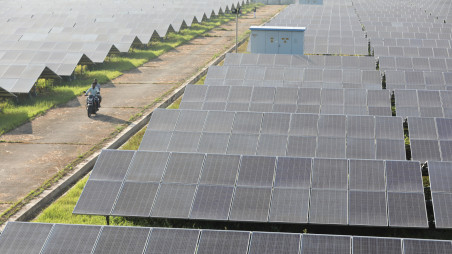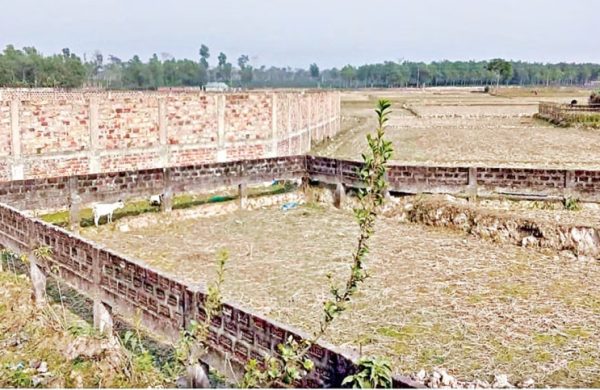Govt’s 5,238MW grid-tied solar push faces tepid response from investors
- Update Time : Sunday, May 11, 2025

Staff Correspondent:
The government’s ambitious push to install 5,238 megawatts of grid-tied solar power at 55 sites across Bangladesh has hit a stumbling block. Despite repeated deadline extensions for tender bids, the initiative has drawn a lukewarm response, signalling eroding confidence in the country’s renewable energy policy.
The Bangladesh Power Development Board (BPDB) floated four international tender packages between 5 December 2024 and 19 March 2025 for the construction of the solar plants from Lalmonirhat in the north to Teknaf in the south.
These tenders, aimed at boosting solar capacity, cover design, installation, supply, testing, commissioning, and land and financing arrangements by private developers.
Yet, by 5 May, the BPDB had sold only 183 tender documents across the four packages. Investor disinterest has prompted repeated delays, with the bid submission deadlines extended between one and five times for each package.
According to BPDB data, 11 plants have seen zero tender document sales, while another 13 received only a single response – raising questions about confidence in the country’s renewable energy policies.
Officials at the BPDB said the outlook remains uncertain. “Despite our efforts to give bidders enough time to evaluate projects, many are staying away,” said one official, requesting anonymity. “The trust deficit surrounding our energy policy is proving hard to overcome.”
“We are trying to attract credible companies in this new round of bidding after cancelling previous Letters of Intent,” said Muhammad Fouzul Kabir Khan, adviser to the power, energy and mineral resources ministry.
“However, we remain cautiously optimistic,” he added.
PACKAGE BREAKDOWN
The first package, comprising 12 plants with a combined 353MW capacity, was initially due for submission on 3 February. It has since been rescheduled five times, with the current deadline set for 19 May.
So far, 95 bid documents have been sold. Of these, the 45MW plant at Bhaluka substation attracted the most interest with 19 bids, while several others – such as Hathazari, Bajitpur, Chandraghona, and Nobabganj – each drew only three.
The second package, for ten 50MW plants (500MW total), received just 39 bids despite four extensions. Sales began on 8 January, with the first deadline on 10 March. Panchagarh substation saw the highest engagement with nine bid documents sold, while Muktagacha drew only one.
In the third package, launched on 27 January, the BPDB proposed 19 solar plants totalling 1,780MW. After three deferrals, the submission deadline is now 22 May.
Of 42 bid documents sold, the Moulvibazar substation (100MW) received the highest interest with six documents, while seven 100MW plants attracted just one bid each. Proposed plants at Pekua (70MW) and Gopalganj (100MW) saw no bids at all.
The fourth package, the largest in capacity, involves 14 plants with a total output of 2,605MW. Originally slated for submission on 28 May and now pushed to 18 June, this package has seen just seven bid documents sold. Nine plants – totalling 1,615MW – have yet to attract a single buyer.
POLICY VOLATILITY UNDERMINES CONFIDENCE
Industry insiders point to a series of abrupt policy shifts as the reason behind the dismal investor turnout.
In November 2023, the government revoked 31 solar power plant deals signed under the Quick Enhancement of Electricity and Energy Supply (Special Provision) Act – contracts awarded without competitive bidding.
These cancelled projects, totalling 3,287MW and backed by an estimated $6 billion in foreign investment, left investors blindsided. Fifteen companies have since filed 11 writ petitions with the High Court, seeking redress. Many had already secured land, set up offices, and were preparing to import machinery.
“The cancellations have had a chilling effect on investor sentiment,” said Shafiqul Alam, lead analyst at the Institute for Energy Economics and Financial Analysis (IEEFA). “Many of these investors had been preparing for years.”
BPDB officials concede that interest remains tepid, and further deadline extensions may be necessary. “For packages 3 and 4, we initially allowed only a month for bid submissions,” said one official. “This time we’re giving over two months. Still, response remains far below expectations.”
OUTREACH EFFORTS FALL FLAT
The BPDB has reached out to multilateral lenders like the World Bank, Asian Development Bank, and local financier Infrastructure Development Company (IDCOL) to promote the tenders.
It has also engaged with diplomatic representatives from more than a dozen countries, including the US, UK, Japan, Germany, and China. But the results remain underwhelming.
Hasan Mehedi, chief executive of the Coastal Livelihood and Environmental Action Network (CLEAN), also attributed the lack of traction to inconsistent policy signals.
“The government’s arbitrary cancellation of contracts has damaged investor trust,” he said. “If the interim government wants to restore credibility, it must assure policy continuity.”
When asked what kinds of responses BPDB is getting from investors, Md Rashedul Haq Prodhan, secretary of BPDB, said, “We can’t say anything definitively until we find how many bidders finally dropped their bids.”


















